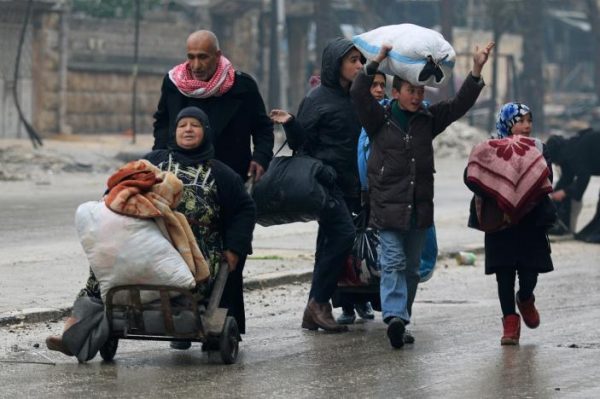
Since the Arab Spring protests in Syria descended into civil war more than five years ago, the number of atrocities there has been stunning, from the use of chemical weapons by the regime of President Bashar Assad, to the targeting of civilians by nearly all combatant armies (though overwhelmingly by the Syrian government forces), to the unforeseen rise of the Islamic State with its barbaric executions of innocent people. Since the war began, an estimated 400,000 people have been killed, some 4.8 million have fled the countryand 6.6 million more have been internally displaced.
The siege of Aleppo has come to symbolize the Syrian civil war’s numbing brutality. The city had served as a main base for rebel forces since just after the war began, and it became Assad’s prime target after Russia entered the war on his behalf. Pro-Assad forces, including Iranian-backed militias, surrounded Aleppo in July, shut off supply and escape routes for the rebels (who were lumped together under a broad “terrorist” label), and, with the help of Russian jets, have turned rebel-held sections of the city to rubble. A Turkey-brokered ceasefire fell apart this week almost before it started. And as the pro-government forces advance, international monitoring groups say, civilians have been murdered indiscriminately.
The siege of Aleppo has come to symbolize the Syrian civil war’s numbing brutality
Assad clearly shoulders the primary blame for this, but Russia bears a load as well. Russian President Vladimir Putin intervened on behalf of the despotic Assad, a longtime military ally, for strategic reasons: Russia’s only eastern Mediterranean land presence is a base in Syria. Furthermore, intervening so decisively in Syria signals that Russia is a global power to be reckoned with — a message that resonates politically at home, and is in line with Putin’s global ambitions. Throughout, Russia has insisted that it is interested only in curtailing the spread of terrorism and bringing peace to Syria. But instead of forcing Assad to find a negotiated political settlement to the conflict, Putin has dangled ceasefires that went nowhere while helping Assad regain territory through the use of horrific violence. Russia has saved the regime from what seemed only year ago to be a looming defeat.
The usual place to seek resolution to such conflicts is the U.N. Security Council. But each of the five permanent members has a veto, which means that Russia has been able to block the council from even condemning the atrocities in Syria, much less imposing sanctions or other measures. It similarly will be able to block any efforts to refer war crimes committed during the conflict to the International Criminal Court for prosecution.
So where does that leave those who still hope for peace? It’s unclear. With the fall of Aleppo, the rebel groups’ bargaining position weakens even further. Whether that can lead to more fruitful peace negotiations is unknowable; as the rebels weaken, Assad has less reason to seek a political solution. But he should, if not for the sake of his own citizens, then for the sake of having a shred of a country left. International leaders should increase the pressure on both Assad and Putin to bring the war to a close as quickly as possible, with as few additional deaths as possible, so that attention can turn more fully to eradicating Islamic State.
No one knows what approach President Trump will take, but we hope that his planned re-start of diplomatic relations with Putin will not mean acquiescence. Unless Assad and Putin plan on killing every single person opposed to the Syrian regime, the only solution to this debacle remains a political one. And the longer the world lets it go on, the darker will be its legacy.
Source: LA TIMES Editorial Board

Leave a Reply
You must be logged in to post a comment.